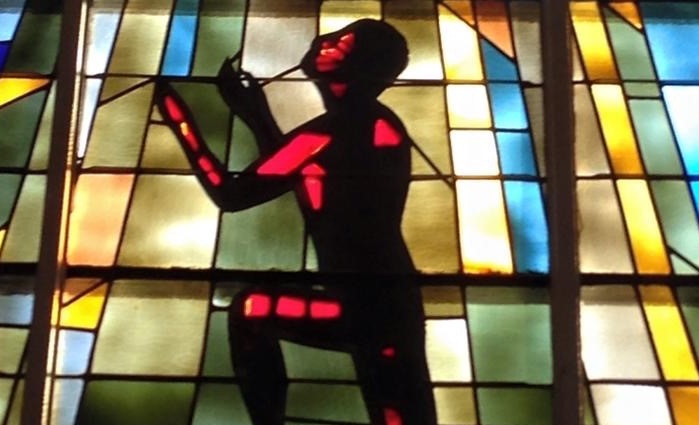I always think of Saint Philip Neri around Pentecost. You might’ve not heard of him; he’s less popular these days than he used to be.
He was a priest in Rome in the middle of the sixteenth century, a great preacher, charismatic; he founded the Oratory, a priestly community still in existence all over the world. A great reformer, instead of tearing the Church to pieces like Luther or Calvin, he worked to heal the Church from within, enlivening a lethargic, and in many instances, a corrupt institution by returning to the basics of prayer, sacraments, and good preaching. And, of course, genuine trust in and submission to the Holy Spirit.
For Philip Neri, he took it to miraculous lengths. In his younger days, he used to sneak into the catacombs outside Rome and pray to the Holy Spirit (they were strange lonely places then, before tourism). Once in 1544, praying in the catacombs, the story goes a ball of fire entered his mouth. He felt his chest begin to burn and swell. Philip fell to the ground; in pain he cried out, “Enough, Lord, enough! I cannot take anymore!”[1] It was an experience that changed his life and his eternity, marking him spiritually and even physically the rest of his days. Whenever he referred to it, he would simply say, “Vulneratus caritatis sum ego—I have been wounded by love.”[2]
But he was a weird one. We wouldn’t ordain him today; if I acted like Philip Neri, you’d call the bishop to have me committed. For instance, sometimes he fell into ecstasies when he came into contact with the Blessed Sacrament or other holy things. Once he got his hair cut in the middle of Mass; he sometimes wore his vestments inside out.[3] Mingled with his wisdom was sometimes strange advice, like when he told a woman that, spiritually speaking, the best thing for her would be for someone to hit her with a stick.[4] He used to pray sometimes, “Lord, keep your eye on me today. I fear that I may betray you.”[5] This was a priest that was dangerous to be around, not a professional at all. He was one of the most effective and beautiful preachers of his time, of all time, a spiritual master of purest love. But he was a weird one, dangerous. When he preached, some thought they saw sparks in his mouth.[6] He said once, plainly, “I believe I have the Spirit of God.”[7] A strange priest, dangerous; we wouldn’t ordain him these days, and you probably wouldn’t want that sort of priest anyway.
Perhaps you understand now why I think of Saint Philip Neri these days around Pentecost, about his power compared to my pettiness; about his priesthood compared to my professionalism. Philip Neri was a priest; I am a “pastoral administrator.” You see what I’m getting at? It’s what we’ve done to the Church, what we’ve done to Christianity. We’ve made it decent and safe. We’re all now professionals, credentialed. Trained to play our part in a managed world; trained to offer you your safe doses of religion when and where you want it; no prophets please, just weddings; no sacrifice, just sentiment. You see what I’m getting at? It’s what we’ve done to the Church, to Christianity; we’ve made it all very safe.
I speak, of course, not only about myself, but all of us. I’m always interested when someone says to me, “I want to make God a priority in my life.” A “priority,” that’s an interesting way to put it, as if God is something to arrange in your life—something you arrange—and not the Lord, as he insists he is, who gives you his will accomplish in full, not merely to fit into your schedule. If he’s God, he gets all of you. If Lord, he’s Lord of everything or nothing. God is more than a priority; he’s life itself. God doesn’t want just a portion of your time, a portion of your mind; he wants all of it. Christ doesn’t want to play it safe with you; he wants death and resurrection, a new creation, not just another “decent” Christian.
Friends, what I’m trying to get at is real faith, real religion, that real Christianity beyond the bureaucratic, beyond what the lawyers tell us we should or should not do. Because such is genuine Christianity, genuine faith. Like that of Philip Neri; like that of John Wesley with his “strangely warmed” heart, that’s what Christianity truly is, that weird and dangerous reality; it’s what happens when we let the Spirit come.[8] It’s what I pray happens to me; I pray it happens to you too—that the Spirit falls on all of us, and that we embrace how weird it is, how dangerous; that, tired of the stale safety of decent religion, we pray, “Come, Holy Spirit.” And that we mean it. And that we’re different. Amen.
[1] Paul Türks, Philip Neri: The Fire of Joy, 17
[2] Ibid., 113
[3] Ibid., 99
[4] Ibid., 110
[5] Ibid., 127
[6] I bid., 113
[7] Ibid., 120
[8] The Journal of John Wesley, 56
© 2019 Rev. Joshua J. Whitfield










